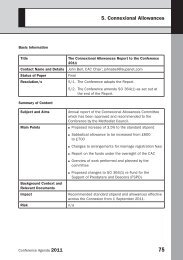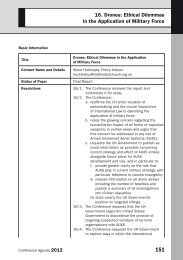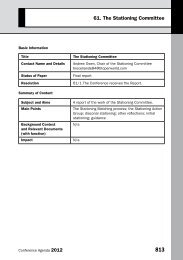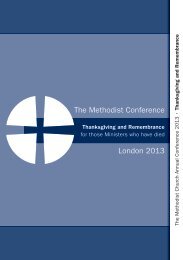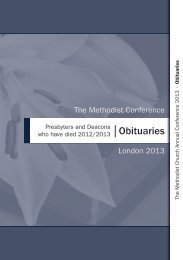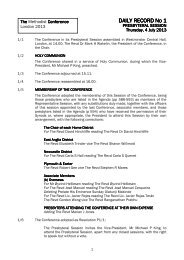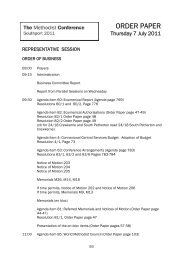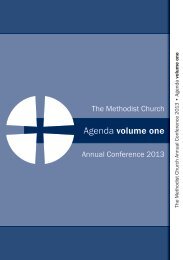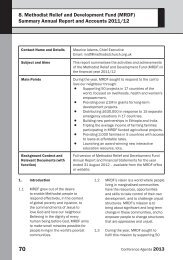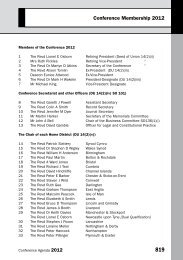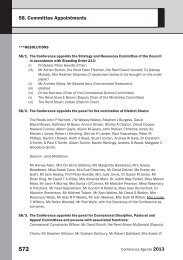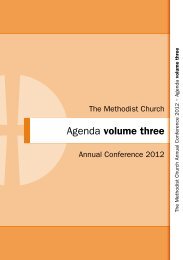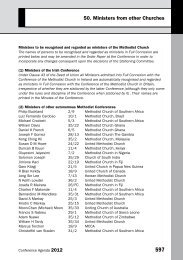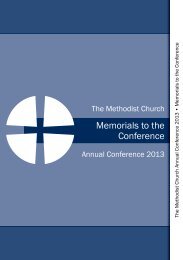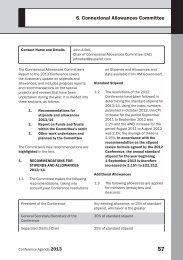Agenda Volume 2 - Methodist Conference
Agenda Volume 2 - Methodist Conference
Agenda Volume 2 - Methodist Conference
Create successful ePaper yourself
Turn your PDF publications into a flip-book with our unique Google optimized e-Paper software.
35. Larger than Circuit<br />
group mentioned above but would<br />
need to have some common<br />
membership so as to keep in touch<br />
with emerging developments within<br />
the districts.<br />
e) Connexionalism<br />
110. Earlier in the report are to be<br />
found comments about how far<br />
attitudes to connexionalism have<br />
changed over the years, and even<br />
in the recent past. The very proper<br />
focus on the contextual nature of<br />
mission and ministry brings with<br />
it challenges – not least, the risk<br />
of personality-driven or exclusively<br />
local agendas – and there is a<br />
continuing need to hold that in<br />
tension with connexionalism. There<br />
is a difference between recognising<br />
and celebrating our diversity and<br />
fragmenting our Connexion.<br />
111. It will be clear that there is the<br />
potential for a much greater<br />
fragmentation if the <strong>Conference</strong> in<br />
2015 were to receive proposals for<br />
a multiplicity of different ‘larger than<br />
circuit’ patterns. To some extent<br />
the ‘accompanied’ nature of the<br />
process, through the resources of<br />
material and personnel provided,<br />
may mean that this does not present<br />
a significant challenge. But the<br />
working party would point out that<br />
there are two connexional bodies<br />
which would very much have this<br />
question on their agenda in any case:<br />
the Faith and Order Committee and<br />
the Law and Polity Committee.<br />
112. Progress reports on the Larger<br />
than Circuit reports to the Council<br />
have been made to the Faith and<br />
Order Committee during the last<br />
year. For a number of reasons, the<br />
committee has already been doing<br />
some thinking about the nature of<br />
connexionalism in the twenty first<br />
century and sees a significant link<br />
with the working party’s work. The<br />
working party believes that this is<br />
an important piece of work which<br />
needs to be done in any case, and<br />
brings a resolution to that effect<br />
below. If the proposed process goes<br />
forward, it would be important to<br />
have a robust line of communication<br />
between those primarily charged<br />
under our constitution with reflecting<br />
theologically on these matters<br />
and those who are working on the<br />
development of any new patterns of<br />
‘larger than circuit’ work, and this is<br />
reflected in the resolution.<br />
113. An outline of the current<br />
constitutional provisions as to<br />
districts appears earlier in this<br />
report. It may be that the sort of<br />
responses which are received would<br />
necessitate changes. These might<br />
be ones which could be brought<br />
into effect quite easily, for instance<br />
by the <strong>Conference</strong> amending some<br />
Standing Orders to remove the<br />
mandatory nature of certain existing<br />
requirements. But there might be<br />
more major suggestions which would<br />
raise significant questions about the<br />
nature and functions of districts,<br />
Synods or District Chairs, and work<br />
would need to be done in conjunction<br />
394<br />
<strong>Conference</strong> <strong>Agenda</strong> 2013



